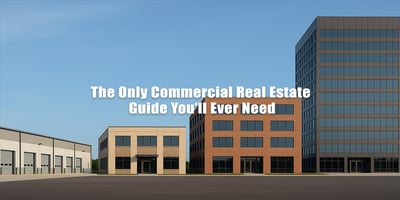Let me tell you something about commercial real estate that most people won't admit: timing is...
How to Become a Million-Dollar Commercial Real Estate Agent
Listen up - if you're thinking about getting into commercial real estate as an agent, you better understand one thing right now: this isn't residential real estate with bigger buildings. This is a completely different game that requires a completely different mindset.
Commercial real estate agents who master this business don't just make good livings - they build generational wealth. But the agents who treat it like glorified residential are the ones struggling to pay their bills.

The Commercial Real Estate Agent Opportunity
Here's what most people don't realize about being a commercial real estate agent: you're not just facilitating transactions - you're orchestrating million-dollar business deals that shape entire communities.
While residential agents fight over $300,000 house sales for $9,000 commissions, commercial agents close $10 million deals for $300,000 commissions. Do the math. Which business would you rather be in?
Higher Transaction Values: Commercial deals start where residential deals end. A small office building might sell for $2 million. A shopping center could be $20 million. Industrial complexes can hit $100 million or more.
Longer Client Relationships: Commercial clients don't buy and sell properties like residential buyers. They build portfolios over decades. One good client relationship can generate millions in commissions over time.
Repeat Business: Successful businesses grow and need more space. Real estate investors acquire multiple properties. Your clients become long-term revenue streams, not one-time transactions.
Professional Respect: You're dealing with CEOs, business owners, and serious investors. These relationships open doors to opportunities far beyond real estate commissions.
What Separates Successful Commercial Agents
The commercial real estate agents making seven figures aren't just working harder - they're working smarter with completely different skill sets:
Financial Expertise: You need to understand cap rates, NOI calculations, debt service coverage ratios, and complex financing structures. Your clients expect you to speak their financial language.
Market Intelligence: Successful agents know their markets inside and out - vacancy rates, rental trends, development pipelines, and economic indicators that affect property values.
Relationship Building: This business runs on relationships. The agents who succeed invest years building networks with property owners, investors, lenders, attorneys, and other professionals.
Consultative Selling: You're not showing properties - you're providing strategic advice on major business decisions. Your clients need trusted advisors, not just transaction facilitators.
Industry Specialization: The top agents specialize in specific property types or markets. You can't be an expert in everything, but you can dominate a niche.
Building Your Commercial Real Estate Foundation
If you want to succeed as a commercial real estate agent, you need to build the right foundation from day one:
Education and Credentials: Get your real estate license, but don't stop there. Pursue commercial-specific education through CCIM, SIOR, or other professional organizations. These credentials separate professionals from pretenders.
Choose Your Specialty: Decide whether you'll focus on office, retail, industrial, multi-family, or land. Pick based on your market's opportunities and your personal interests, then become the expert in that space.
Join the Right Brokerage: Not all commercial brokerages are created equal. Look for firms with strong market presence, experienced mentors, and systems that support commercial transactions.
Invest in Technology: Commercial clients expect sophisticated market analysis and financial modeling. Invest in the software and systems that make you more efficient and effective.
Build Your Brand: Your personal brand in commercial real estate needs to communicate expertise, professionalism, and results. This isn't about flashy marketing - it's about demonstrating competence.
The Commercial Agent Business Model
Understanding how commercial real estate agents actually make money is critical to your success:
Commission Structure: Commercial commissions typically range from 4-6% of the transaction value, split between buyer and seller sides. On a $5 million deal, that's $100,000-$150,000 per side.
Longer Sales Cycles: Commercial transactions take longer than residential - often 6-18 months from initial contact to closing. You need patience and persistence.
Higher Due Diligence Requirements: Commercial deals involve extensive financial analysis, inspections, and legal work. You coordinate complex processes with multiple professionals.
Relationship-Based Business: Most commercial agents generate 80% of their business from repeat clients and referrals. One good relationship can sustain your career.
Prospecting and Lead Generation for Commercial Agents
Commercial real estate prospecting is nothing like residential cold-calling. Here's what actually works:
Target Business Owners: Focus on companies that are growing, relocating, or expanding. These businesses need real estate solutions.
Network with Professionals: Build relationships with commercial lenders, attorneys, accountants, and business brokers. They refer clients who need real estate services.
Property Owner Outreach: Many commercial deals come from direct relationships with property owners looking to buy, sell, or lease space.
Market Farming: Become the expert in specific geographic areas or property types. Consistent market presence generates opportunities.
Industry Events: Attend commercial real estate conferences, business networking events, and industry meetings. Face-to-face relationship building still matters.
Serving Different Types of Commercial Clients
Commercial real estate agents work with diverse client types, each with different needs and expectations:
Small Business Owners: Often first-time commercial buyers who need education and guidance through the process. High touch, relationship-focused service.
Real Estate Investors: Sophisticated clients who understand the numbers and expect market expertise. They value agents who can source off-market deals.
Corporate Users: Businesses with real estate departments that have specific requirements and formal processes. Professional presentation and detailed analysis are critical.
Developers: Complex projects requiring zoning knowledge, entitlement processes, and long-term relationship management.
Institutional Clients: Large corporations, REITs, and investment funds with substantial purchasing power and high service expectations.
The Technology Edge for Commercial Agents
Modern commercial real estate agents leverage technology to provide better service and win more business:
Market Analysis Tools: Software that provides real-time market data, comparable sales, and rental rate analysis.
Financial Modeling: Programs that help clients understand investment returns, financing options, and cash flow projections.
Property Search Platforms: Advanced databases that help you quickly identify properties meeting specific client criteria.
Customer Relationship Management: Systems that track client interactions, follow-up schedules, and transaction progress.
Marketing Technology: Professional presentation tools, virtual tour capabilities, and digital marketing platforms.
Common Mistakes That Kill Commercial Careers
Learn from others' failures so you don't repeat them:
Treating It Like Residential: Using residential sales techniques in commercial transactions destroys credibility with professional clients.
Not Specializing: Trying to be everything to everyone means you're not an expert in anything. Specialization builds expertise and referrals.
Ignoring the Numbers: If you can't explain financial metrics and investment returns, you can't serve commercial clients effectively.
Poor Follow-Up: Commercial sales cycles are long. Agents who don't maintain consistent contact lose deals to competitors.
Undervaluing Relationships: Focusing only on immediate transactions instead of building long-term client relationships limits your earning potential.
Building Long-Term Wealth as a Commercial Agent
The most successful commercial real estate agents don't just earn commissions - they build wealth through multiple income streams:
Transaction Commissions: Your primary income source, but not your only one.
Property Management: Many commercial agents also manage properties for clients, creating recurring monthly income.
Consulting Services: Providing market analysis, feasibility studies, and strategic advice for ongoing fees.
Investment Partnerships: Participating in deals as an investor alongside your clients.
Property Ownership: Using your market knowledge and relationships to build your own commercial real estate portfolio.
The Market Trends Shaping Commercial Real Estate
Successful commercial agents stay ahead of market trends that affect their clients:
Remote Work Impact: How changing office needs affect commercial space demand.
E-commerce Growth: The boom in industrial and logistics properties serving online retail.
Mixed-Use Development: The trend toward combining residential, retail, and office in single projects.
Sustainability Focus: Green building standards and energy efficiency becoming standard requirements.
Technology Integration: Smart building systems and high-speed connectivity as competitive advantages.
Your Path to Commercial Success

Building a successful commercial real estate career requires a strategic approach:
Year 1-2: Focus on education, building relationships, and learning your market. Don't expect big commissions immediately.
Year 3-5: Develop your specialty and build a client base. Start seeing consistent deal flow and larger transactions.
Year 5+: Leverage your expertise and relationships for bigger deals and multiple income streams. This is when the real wealth building begins.
The Bottom Line
Commercial real estate offers unlimited earning potential for agents who approach it professionally and strategically. But success requires more than just a real estate license - it demands expertise, relationships, and a long-term commitment to serving clients at the highest level.
Don't get into commercial real estate because you think it's easy money. Get into it because you want to build a career that creates wealth for yourself and your clients.
The commercial real estate market needs agents who understand business, finance, and long-term relationship building. If that sounds like you, this could be the career that changes your life.
But remember: in commercial real estate, you don't just sell properties - you solve business problems. Make sure you're ready for that level of responsibility and opportunity.
The question isn't whether commercial real estate can make you wealthy. The question is whether you have what it takes to succeed in this business.
Do you?




